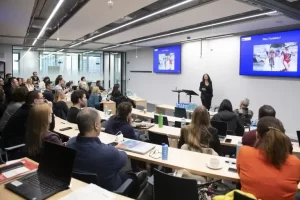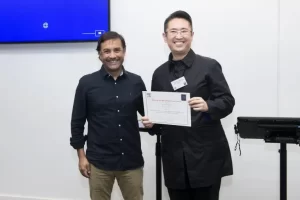On November 15-17, Impact Bridge-IE Chair and Journal Of Business Venturing Insights cohosted the 2022 JBVI Entrepreneurship Academy; a three-day high level event intended for PhD students and early career researchers within 2 years of graduation who want to get a deep understanding of entrepreneurship as field, new topics in entrepreneurship, innovative research methods, and conceptual modelling and theorizing. In addition, each participant had the opportunity to receive feedback on their research project and overall guidance around how they can both develop a publication strategy and embed impact early on into their PhD projects.
The call for proposals was successful and being finally sleceted 32 phd students/Junior Faculty to participate in the event from 110 high-quality applications and top universities . Participants came from all around the worlds, including Copenhagen Business School, Judge Business School, University of Cambridge, HEC Montréal, Universidad del Desarrollo (Chile), Technical University Munich, University of Canterbury, New Zealand and London Business School,etc.
As part of the submission process, candidates aiming for the best paper awards and one-to-one mentoring, had to present A 6-page abridged paper.
Best paper awards
Impact Bridge-IE research impact award. Sponsored by the Impact Bridge-IE Chair of Social Entrepreneurship and Impact investing, this award seeks to celebrate and encourage methodologically rigorous and societally beneficial entrepreneurship studies contributing knowledge and with the potential to make the world a better place. The award-winning researcher was Alicia Riolino, from London Business School, who received €500 and a certificate of recognition from the sponsors.
Journal of Business Venturing Insights best paper award. In line with the mission of the Journal of Business Venturing Insights, this award seeks to celebrate thought-provoking research, both empirical and theoretical. Empirical papers could include unusual findings, a theoretical descriptions, non-findings or replication of established relationships, or single experiments. Theoretical papers could include thought-provoking examples or juxtapositions. Other papers include simulations and scale and other methodological developments. The award-winning paper was awarded to Mingchu Wang, from Leeds University Business School, UK with a certificate of recognition from JBVI and Elsevier and be considered for publication in the journal.
The Academy was divided into four parts:
- Seminar sessions, combining key theories and theory development in entrepreneurship research. In each session, the facilitator made a short presentation followed by a collective discussion of key papers. Students were required to read and comment on papers for each session.
- Sessions on methodological innovation in entrepreneurship research. In this session, the mentors introduced and discussed research methods papers and applications of innovative research designs and methods in substantive entrepreneurship research.
- Publishing and impact in entrepreneurship research.
- One-to-one mentoring
Mentors and speakers
- Dimo Dimov, University of Bath, UK
- Rachida Justo, IE Business School, Spain
- Prof Andreas Kuckertz, University of Hohenheim, Germany
- Daniel Lerner, IE Business School, Spain
- Hana Milanov, Technical University Munich, Germany
- Pablo Munoz, Durham University, UK




